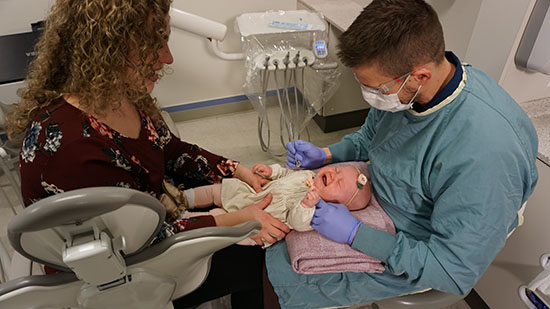
Pediatric dentist Darsi Perusini says regular visits to the dentist before and during pregnancy are important.
Along with genetic traits, parents can also pass on cavities to their babies, says a University of Alberta pediatric dentist.
"Tooth decay is a transmissible disease," said Darsi Perusini. "Parents don't realize that cavities are related to bacteria and not always caused by eating too much sugar. If you've had a cavity, then the cavity-causing bacteria are present in your mouth, and will stay there for life."
That's why the clinical instructor says regular visits to the dentist before and during pregnancy are important.
"Getting a dental exam and your teeth cleaned during pregnancy is safe," said Perusini. "What happens in the mom's mouth will likely happen in the child's mouth. At some point you are going to share spit with your baby, and bacteria travels through spit. It can be transferred to your child by a kiss or sharing a straw."
If you are pregnant or planning on getting pregnant, Perusini said, getting a dental exam will help identify any problems that could arise.
Visiting the dentist during your second trimester is most ideal, he said. The fetus is still developing during the first trimester, and the third trimester can be uncomfortable for expecting mothers.
Amanda Ross didn't have to be told twice about the importance of visiting her dentist.
"I had a few cavities when I was younger, so I am aware I can pass this down to her," said the mother of a four-month-old.
A patient of Perusini's, she credits her regular visits for her own healthy mouth as well as her daughter's.
"Sometimes I wonder if I've kissed her too close. I want to keep her mouth as healthy as I can," said Ross, adding she tries to be as careful as she can snuggling and kissing Charlotte, who is expecting her first tooth next month.
Ross said she wipes Charlotte's mouth every day with a warm cloth to clean it out and prepare her for the habit of brushing her teeth once they come.
Perusini recommends that children be seen by a dentist within six months of the eruption of their first tooth or by the time they're a year old.